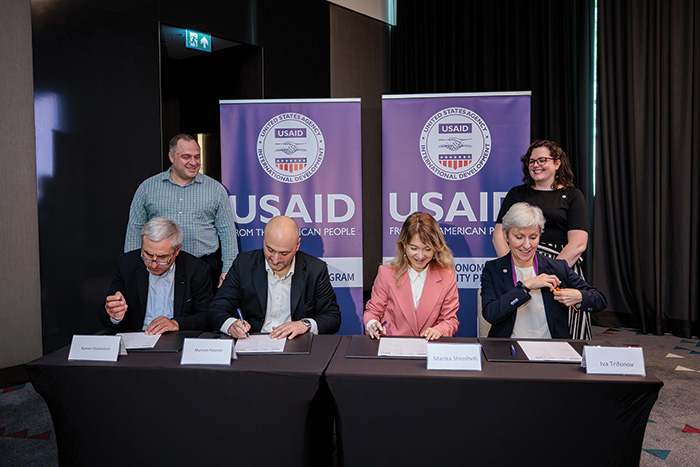Good for the bottom line – hospitality industry highlights green initiatives that save money
Environmentally sustainable business practices are not only good for the environment and the people of Georgia, but are essential bottom line priorities for business. This is particularly true in the hospitality and tourism industry, where Georgia’s hospitality industry is trailblazing successful models for others to follow.
As Iva Trifonov, General Manager of Sheraton Grand Tbilisi Metechi Palace points out, this sustainability drive is reflected in the traditional practices of bakers throughout Georgia, who wrap the iconic shoti bread in paper rather than plastic. She believes this practice shows respect for both the bread and for the environment. It is her hope that Georgia’s businesses can take inspiration from its bakers and eliminate plastic bags and packaging completely.
Her hopes are well founded. There is a paradigm shift towards more ecologically sound business practices within Georgia’s hospitality industry. The collaboration between prominent international hotels, AmCham, USAID, the Adjara Ministry of Finance and Economy, and recycling firms Kere and Biodiesel, is creating a vibrant blueprint of waste commercialization, job creation, and effective product utilization.

The tourism industry benefits substantially from companies protecting the environment and promoting sustainable practices. More and more tourists are looking for eco-conscious lodging and experiences when they travel. For companies, the cost of high energy usage and overconsumption of single-use waste negatively impacts the bottom line.
Hospitality companies of all scales save money by decreasing their waste, implementing proper solid waste disposal, and reducing their consumption. Implementation of sustainable environmental practices strengthens the tourism industry and ensures that Georgia remains a desirable tourist destination for future generations. From entrepreneurs to large corporations, each of us has a vested interest in doing our part in protecting the environment to fulfill our personal and corporate social responsibility.
Partnerships increase environmental protection, profit
Companies are recognizing the monetary benefits derived from sustainable practices: from cost savings in waste reduction, to job creation in the renewable energy sector. In this vein, USAID-supported, private-sector-led partnerships are driving significant reduction in waste generation, elevating the commercial aspect of solid waste management, and creating employment opportunities.
Partner workshops have cast light on the pressing need for solid waste management, and highlighted practices others can adopt. At one such workshop, Hilton Batumi noted that 60% of the world’s waste is not recycled or disposed of properly, and 70% less energy is needed to create products from recycled materials than raw materials. At hotels, for example, one kilogram of waste per overnight guest is generated each day. Recognizing these conditions, Hilton Hotel Batumi began monitoring their waste and discovered that the hotel threw away 130,000 glass bottles, 452,000 plastic bottles, and 99,000 aluminum cans in 2020.
These data points outlined the imminent need to implement recycling systems, driving a shift towards more sustainable business models. Hilton Batumi appointed champions for specific environmental issue areas and began rewards initiatives within their company to encourage participation in solid waste management. The hotel saves money by purchasing larger product dispensers, which also cuts down on waste, and keeps better inventory to decrease the amount of ordering and avoid overstock spoiling.
Thanks to their fruitful partnership with Kere LTD, Hilton Batumi delivered 500 kilograms of glass in May. Their introduction of recycling systems and appointment of environmental stewards has led to significant savings and waste reduction, a model that others in the industry can adopt. More generally, the success of this initiative is demonstrated by the recycling of over 105 tons of glass waste from partner hotels between February and May.

Promoting a “Waste Not” approach, Sheraton has set ambitious targets to reduce food waste by 30% by 2025. To achieve their goals, they developed a sustainability tracker that measures energy consumption per square meter, intensity of water usage in occupied guest rooms, and other data. They have demonstrated waste of single-use plastics by upcycling shampoo bottles into an animal sculpture and want to inspire others to creatively tackle waste management issues.
Moreover, this momentum is being transferred to other industry leaders, such as Radisson Blu, Castello Mare, GMT Group, Ambassador, and the Adjara Group, and local recycling companies and smaller hospitality businesses are also beginning to pick up the trend. The collaboration between large hotels and local recycling companies is creating an evolving best practice model for smaller enterprises. Replacing plastic toiletries with refillable containers, turning waste into new products, and conserving water and energy are strategies within grasp for businesses of all sizes, benefiting both the environment and their bottom line.
Benefit for other sectors
The success of these USAID-supported initiatives, however, is not limited to the hospitality and tourism industry: businesses in many sectors of Georgia’s economy profit from environmental stewardship. When an industry shifts to installing renewable energy sources on its properties, jobs are created for the manufacture, installation, and maintenance of the machinery. As waste management and recycling companies like Kere LTD and Biodiesel thrive and expand, they and their competitors are hiring more skilled labor and creating better jobs across Georgia. And industries like light manufacturing benefit from lower production costs when using recycled materials.
By adopting environmentally friendly practices, enterprises can contribute to environmental protection, strengthen the tourism industry and Georgia’s economy, and create substantial job opportunities. The collective efforts, from bakers using paper instead of plastic to hotels partnering with local recycling centers, encapsulate the essence of sustainability, enabling companies to protect the environment while optimizing their business operations.

